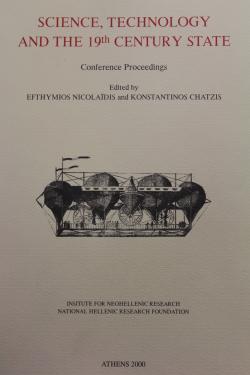Science, Technology and the 19th-century State
| Title | Science, Technology and the 19th-century State |
| Publication Type | Conference Proceedings |
| Year of Publication | 2003 |
| Editors | Nicolaidis, E, Chatzis, K |
| Conference Name | Science, Technology and the 19th-century State |
| Pagination | 150 |
| Date Published | 2003 |
| Publisher | Institute for Neohellenic Research / National Hellenic Research Foundation |
| Conference Location | Syros, Greece |
| Publication Language | English, French |
| ISBN | 978-960-7916-28-0 |
| Abstract | The articles presented in that volume do not form part of a general theory which seeks to illustrate the link between science, technologies and the construction of the State in the 19th century, which does not, of course, prevent them from drawing on theories developed in works of a more theoretical nature. However, their grouping together in this work is not, we hope, just a simple juxtaposition. Over and above their diverse themes, the contributions which make up the book are characterized by the same « deglobalizing » approach: without denying the importance of a general framework in the study of the relationships between science, technology and the State during the 19th century, they favour an approach which is based on groups or even individuals. It is through the action of actors in the fields of science and technology, such as engineers and instrument makers, producers of knowledge and popularizers of it, that the authors of this publication have attempted to deal with the triptych « Science, technology and the State in the 19th century ». |



